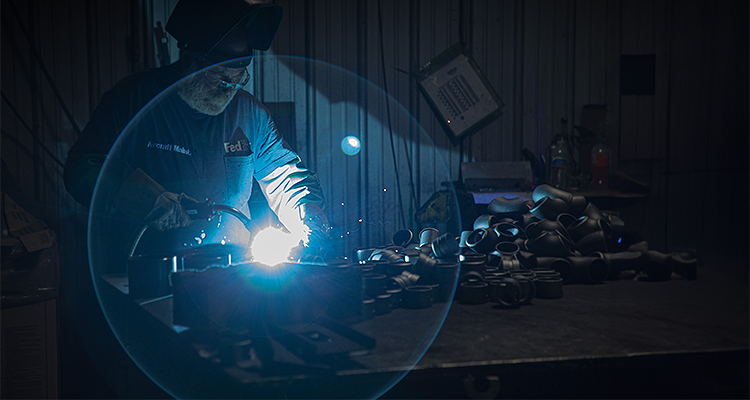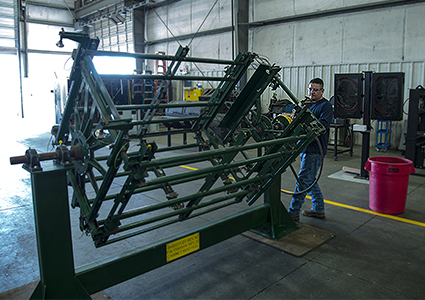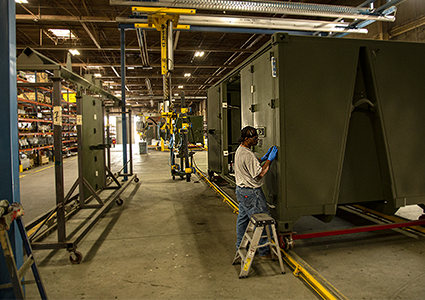
Anchor Fabrication’s Year of Robust Growth
It’s been around a year since Manufacturing Today last sat down with Anchor Fabrication (Anchor), one of the largest contract metal manufacturers and fabricators in the US. With a growing footprint that’s currently based between Fort Worth, Mississippi, Tennessee, and Kansas, it’s fair to say that the organization’s expertise extends beyond its mainstay of production, and well into the realm of growth management. We’re catching up with Greg Frye, Anchor Partners COO and Anchor Fabrication’s CEO, to hear all about how the business has fared over the last 12 months.
“The biggest development that 2022 brought us was the significant continued growth we experienced across all of Anchor’s fabrication businesses,” Greg opens. “From a demand perspective, each of our locations has seen an increase of between ten and 30 percent.
“We have just completed our fourth acquisition in Wichita, KS, which is going to be a huge benefit to our operations. See, although our three current businesses are all based in fabrication, they have different areas of expertise.
 “Fort Worth works with our big, heavy gauge and large welded assemblies clientele, serving trailer and military producers,” he explains. “Whereas Mississippi is more focused on our mid-gauge customers such as TK Elevators and FedEx – we do repairs and produce their dollies, baggage carts, and roller decks. Finally, there’s Tennessee, which specializes more so in light gauge aluminum products like cab doors, sleepers, and utility truck bodies. Our recent acquisition in Kansas brings and new suite of customers into the Anchor family.
“Fort Worth works with our big, heavy gauge and large welded assemblies clientele, serving trailer and military producers,” he explains. “Whereas Mississippi is more focused on our mid-gauge customers such as TK Elevators and FedEx – we do repairs and produce their dollies, baggage carts, and roller decks. Finally, there’s Tennessee, which specializes more so in light gauge aluminum products like cab doors, sleepers, and utility truck bodies. Our recent acquisition in Kansas brings and new suite of customers into the Anchor family.
“So, although there’s a bit of an overlap, they each have their own distinct market base. Where we’ve really been successful here is through cross selling our entire range of offerings across each location. Looking at Tennessee for example, when we took over the site it had a huge customer, to which it strictly sold aluminum components. When we came in and introduced ourselves as Anchor, with our broad scope of capabilities, we were able to add significant work to our Fort Worth facility. We have added approximately $55 million of organic growth to the business by simply referring them to our other locations’ solutions.”
When Greg first joined Anchor nine years ago, it was operating around the $50 million mark. Throughout his tenure, however, the organization has grown by over five times, and with the recent acquisition they will be above $300 million. This supports the owners, Tra Willbanks, strategy and vision of growing to $500 million.
“We believe in entrusting the separate sites with a great sense of autonomy,” Greg continues, “our strengths are hugely based in our local management teams. They’re all standalone enterprises with a full suite of general managers and executive teams, however we do centralize certain elements of operations. This is generally where it makes the most sense, in terms of finance, some HR and IT functions, and platforms for benefits and health insurance.
“So, beyond our own targets for organic growth through expanding our customer bases and cross selling, when it comes to acquisitions, we have two key areas for consideration. The synergies between our businesses and the potential new customers, and the new opportunities with which they can present us, in terms of new market sectors that we can join and, again, cross sell from our other locations into.”
Forward strategy
Greg’s path to Anchor began in the military when he joined the United States Air Force straight out of high school. Six years later, he left for a position with Boeing where he was trained on Toyota’s production systems, Ford’s lean processes, and TOQ, to become a Process Engineering Analyst. He was offered his first role as a CEO at 28 and steadily moved around in the aerospace sector until Tra Willbanks, owner, reached out to him about joining Anchor.
“One of my first actions after joining the business, was to consolidate two of our other companies,” he says. “We found a stable footing, from which we could devise a plan for our next steps and set our initial goals. We then spent maybe four or five years fully stabilizing the business, before setting a five-year target of hitting $500 million, which is pretty good going, given that we’ve hit $300 million in the last three or so years.
Experienced team
“By rationalizing the customer base and rolling out a lean process of operational excellence at the Fort Worth facility, we were able to then implement the same model across both Mississippi and Tennessee, which we can also employ at any newly acquired enterprises. Another successful policy that we’ve thoroughly adopted is to promote from within. If you look across the entire Anchor group, the vast majority of all our key management positions are held by employees that have worked their way up through the ranks.
model across both Mississippi and Tennessee, which we can also employ at any newly acquired enterprises. Another successful policy that we’ve thoroughly adopted is to promote from within. If you look across the entire Anchor group, the vast majority of all our key management positions are held by employees that have worked their way up through the ranks.
“At Fort Worth in particular,” Greg adds, “there must be around 30 team members who have been with us for between 20 and 30 years. Not only is it great for staff mentality to offer a steady path to progression, it also benefits us to hold onto staff that have spent the last five to nine years implementing the current systems. It makes sense to put somebody who has embraced our practices and demonstrated their drive into the more influential roles.”
Anchor is, as Greg states, an ‘unapologetically’ faith-driven business. This is something that the company makes very clear to all its internal and external stakeholders and has a palpable effect on its day-to-day proceedings.
“It doesn’t mean that you’re going to walk in amidst sermons in the corridors or be preached at on a daily basis,” he laughs. “But we want people to be aware of our beliefs and to not take offence when one of my colleagues or I pray before a company luncheon. We have a chaplain service at each of our locations that provides support and prayers for both internal and external issues; if somebody is having problems within their home life or struggling for any reason, it’s a safe space for them to seek out comfort.
New contract
“What’s wonderful is, despite the users’ personal information never being disclosed to myself or anyone else, we do get anonymous statistics of how many people use the service, and it’s very encouraging to see. We anchor our lives in God, and work with our heads, hands, and hearts to achieve our goals.
“We’ve had a very strong year,” Greg concludes. “I fully anticipate that the strong growth we’ve had across the board is set to continue. All of our order books are showing a great increase as the year progresses, so I wouldn’t be surprised if 2023 turned out to be one of our better, if not our best, years yet.
“Simultaneously, material prices are starting to drop and, we’ve added a lot of automation across our plants in recent years, which I’m excited to continue adding to. Our systems literally allow us to step back and let the welding take place automatically. I am sure we will be adding additional Cobots within the next six months..
“Furthermore, we’ve recently signed our largest organic growth contract in the company’s history. This is going to be huge for Anchor as, although I can’t yet release too many details, it’s going to be a $65 million-per-year opportunity, for which we’ve already leased another 178,000 square feet of manufacturing space in Smithville, Tennessee. So that’s really big for us, along with the recent acquisition of JR Custom in Wichita, KS.”